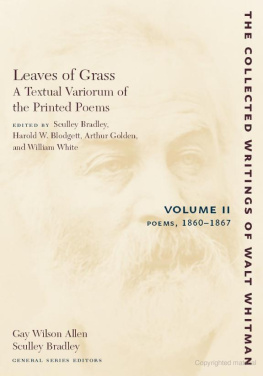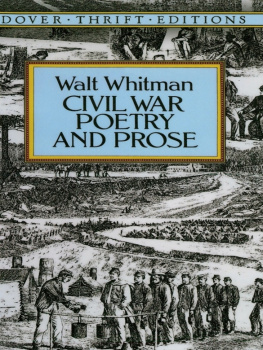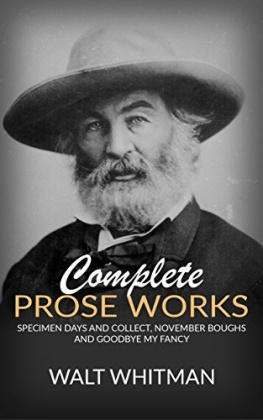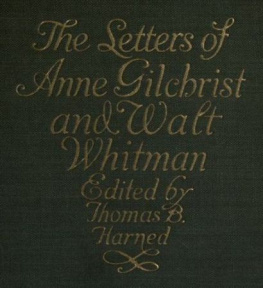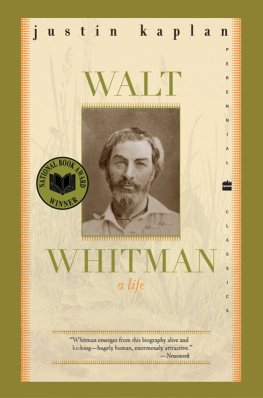Walt Whitman - Manly Health and Training: To Teach the Science of a Sound and Beautiful Body
Here you can read online Walt Whitman - Manly Health and Training: To Teach the Science of a Sound and Beautiful Body full text of the book (entire story) in english for free. Download pdf and epub, get meaning, cover and reviews about this ebook. year: 2017, publisher: Regan Arts., genre: Science. Description of the work, (preface) as well as reviews are available. Best literature library LitArk.com created for fans of good reading and offers a wide selection of genres:
Romance novel
Science fiction
Adventure
Detective
Science
History
Home and family
Prose
Art
Politics
Computer
Non-fiction
Religion
Business
Children
Humor
Choose a favorite category and find really read worthwhile books. Enjoy immersion in the world of imagination, feel the emotions of the characters or learn something new for yourself, make an fascinating discovery.
- Book:Manly Health and Training: To Teach the Science of a Sound and Beautiful Body
- Author:
- Publisher:Regan Arts.
- Genre:
- Year:2017
- Rating:4 / 5
- Favourites:Add to favourites
- Your mark:
Manly Health and Training: To Teach the Science of a Sound and Beautiful Body: summary, description and annotation
We offer to read an annotation, description, summary or preface (depends on what the author of the book "Manly Health and Training: To Teach the Science of a Sound and Beautiful Body" wrote himself). If you haven't found the necessary information about the book — write in the comments, we will try to find it.
In the fall of 1858, a thirteen-part essay series appeared in the New York Atlas, under the title Manly Health and Training. This nearly 47,000-word journalistic effort, written by Walt Whitman under his pen name Mose Velsor, was lost for more than 150 years, buried in just a handful of library archives, until its recent unexpected discovery.
What you hold in your hands is a long-lost health manifesto that, remarkably, is as relevant today as it was back in the nineteenth century. A truly illuminating discovery that reveals much about a little-known period in Whitmans life, this mens guide features earnest recommendations for eating, sleeping, and exercise, emphasizing moderation and focusing on the holistic relationship between the mind and the body:
Be a carnivore: Let the main part of the diet be meat, to the exclusion of all else.
Engage in vigorous exercise: Habituate yourself to the brisk walk in the fresh airto the exercise of pulling the oarand to the loud declamation upon the hills, or along the shore.
Go to bed by 10 p.m.: . . . with a plentiful supply of good air, during the six, seven, or eight hours that are spent in sleep. During most of the year, the window must be kept partly open for this purpose.
Take a cold shower in the morning: In most cases the best thing he can commence the day with is a rapid wash of the whole body in cold water, using a sponge, or the hands.
Wear comfortable shoes: Most of the usual fashionable boots and shoes, which neither favor comfort, nor health, nor the ease of walking, are to be discarded.
Grow a beard: The beard is a great sanitary protection to the throatfor purposes of health it should always be worn, just as much as the hair of the head should be.
Banish depression: If the victim of the horrors could but pluck up energy enough to strip off all his clothes and gives his whole body a stinging rubdown with a flesh-brush till the skin becomes all red and aglow, he would be thoroughly cured of his depression, by this alone.
Filled with Whitmanic aphorisms and beautifully illustrated with contemporary artwork, Manly Health and Training provides essential insight into one of the worlds most beloved poets and his philosophy on manhood, bodily perfectibility, and the future of the American body politic.
Walt Whitman: author's other books
Who wrote Manly Health and Training: To Teach the Science of a Sound and Beautiful Body? Find out the surname, the name of the author of the book and a list of all author's works by series.


